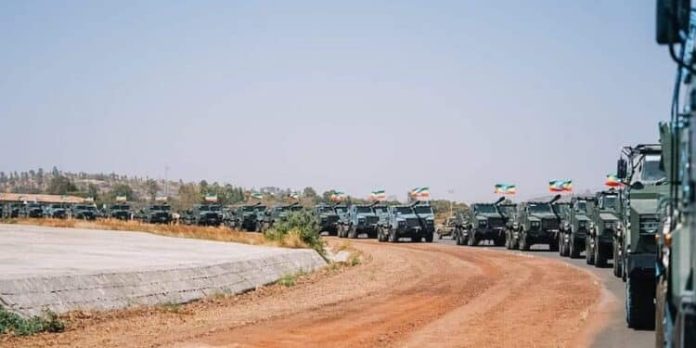Mogadishu, SOMALIA – In a bold display of regional influence, thousands of Ethiopian troops have entered Somalia’s Hiran, Bay, and Bakool regions. This military movement directly challenges the Somali government’s recent demand for Ethiopian forces to withdraw by the end of the year or be considered an occupying force. The development highlights the intricate security issues, sovereignty concerns, and power dynamics in the region.
Ethiopia’s Military Incursion
Ethiopian military operations in Somalia are notable for their scale and reach. In Hiran, Ethiopian forces entered Matabaan town, engaged with local officials and security forces, and then withdrew, warning they would return if Al-Shabab militants were detected. Simultaneously, thousands of Ethiopian troops moved into the Bay and Bakool regions, with many reportedly crossing from El Berde, according to a Southwest State security official who spoke to The Somali Digest.
This multi-faceted operation showcases Ethiopia’s ability to project significant military power beyond its borders rapidly. The incursion is particularly striking given the recent weakening of Somalia’s own military capabilities. The Somali National Army (SNA) has suffered major setbacks, with its UAE-trained forces severely depleted and the Turkish-trained Gorgor forces significantly reduced. In this context, Ethiopia’s show of force emphasizes the power imbalance between the two nations.
Ethiopia’s Strategic Intent
The timing and nature of this Ethiopian military incursion appear calculated to send a clear message: Ethiopia is in Somalia to protect its national interests and will not withdraw merely because the Somali government demands it. This show of military strength serves multiple strategic purposes for Ethiopia, reinforcing its role as a major regional power and challenging the Somali government’s authority over foreign military presence within its borders.
Ethiopia’s actions must be seen in the context of Somalia’s recent political maneuvers. President Hassan Sheikh Mohamud’s government has been pushing for constitutional changes and seeking a term extension, moves that have faced skepticism both domestically and internationally. By demonstrating its ability to enter Somalia at will, Ethiopia effectively undermines the Somali government’s claims of growing strength and autonomy.
Moreover, this incursion comes at a time when Somalia is dealing with a resurgent Al-Shabab. The terrorist group has recently recaptured several major districts and strategic locations, including El Buur, Caad, and Ruun Nirgood. The Ethiopian military’s stated intention to hunt for Al-Shabab militants could be seen as an indictment of Somalia’s failure to contain the threat, further eroding the credibility of President Hassan Sheikh’s administration.
Implications for Somali Sovereignty and Security
The Ethiopian military incursion into Somalia raises serious questions about Somali sovereignty and the government’s ability to control its territory. The ease with which thousands of foreign troops entered the country underscores the fragility of Somalia’s territorial integrity and the limitations of its security forces. This situation is particularly problematic given Somalia’s recent efforts to assert greater control over its security affairs and reduce dependence on foreign military support.
The incursion also exposes the hollow nature of recent claims made by Somalia’s National Security Advisor, Hussein Sheikh-Ali “Hussein Moalim”. Moalim had dismissed reports of Al-Shabab’s resurgence, claiming that “90% of liberated territories are still firmly under government control.” The Ethiopian military’s ability to enter Somalia unimpeded, ostensibly to hunt for Al-Shabab, starkly contradicts these assertions and highlights the disconnect between the government’s rhetoric and the reality on the ground.
Furthermore, the presence of Ethiopian troops in Somalia could potentially exacerbate existing tensions and conflicts within the country. Historical animosities towards Ethiopia run deep in some segments of Somali society, and the visible presence of Ethiopian forces could be exploited by groups like Al-Shabab to rally support and justify their actions as resistance against foreign intervention.
The Al-Shabab Factor
The Ethiopian military incursion into Somalia is inextricably linked to the ongoing threat posed by Al-Shabab. Ethiopia’s stated intention to hunt for Al-Shabab militants underscores the central role that counter-terrorism plays in its strategic calculations. However, this approach raises questions about the effectiveness of external military interventions in combating groups like Al-Shabab.
Recent events have demonstrated Al-Shabab’s resilience and adaptability. The group continues to collect taxes in Mogadishu, despite government claims of progress in dismantling their financial networks. The failure to capture and prosecute Al-Shabab’s tax collectors, even in the capital, raises serious doubts about the government’s commitment and capability to effectively combat the terrorist group.
In this context, Ethiopia’s military incursion could be seen as an attempt to fill a security vacuum left by the ineffectiveness of Somali forces and the drawdown of the African Union Transition Mission in Somalia (ATMIS). However, there is a risk that the visible presence of foreign troops could actually serve to strengthen Al-Shabab’s narrative and appeal among some segments of the Somali population.
Regional Implications and the Role of ATMIS
The Ethiopian military incursion into Somalia has significant implications for regional dynamics and the role of ATMIS. As a key contributor to ATMIS, Ethiopia’s unilateral military action raises questions about the coherence and effectiveness of the multinational mission.
This situation is particularly complex given the planned drawdown of ATMIS forces and the uncertainty surrounding the future of international support for Somalia’s security sector. The recent suspension of U.S. food rations to the Danab special forces, following revelations of massive corruption, has further weakened Somalia’s counter-terrorism capabilities.
Ethiopia’s actions could be interpreted as a vote of no confidence in both the Somali government’s ability to manage its own security and the effectiveness of ATMIS in containing the Al-Shabab threat.

